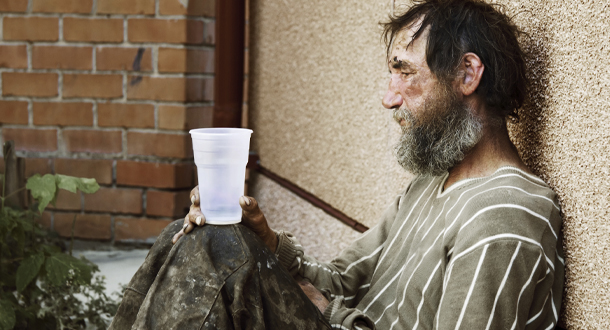
Scripture:
Reflection:
Pope Francis, in his landmark encyclical Laudato Si, is strong in his condemnation of the exploitation of the billions of people living in poverty of mind and body around the globe.
He calls out the comfortable of the world who may be tempted to ignore the sufferings of those living on the edges: the disabled, the elderly, the workers in sweatshops and other dangerous worksites, the garbage dump pickers in major cities, the victims of war abroad and gun violence in homes and on the streets, the physically and mentally ailing, the lonely, the frightened, and the hopeless.
The prosperity of many in North America can make it easy to tune out the hardships of our brothers and sisters living perhaps just a short distance from our affluent, safe neighborhoods.
Recently, while in a very poor area of Louisville to visit a young man who struggles with mental illness and the recent death by drug overdose of his mother, I was struck by what I witnessed. With determination on their faces, people seemed to keep on struggling to get through today as best they could. I saw bent-over, unshaven men in tattered clothes who begged for alms on a street corner, a bent-over woman shuffling along pulling groceries in a wire cart, one young woman dancing in the streets, either high on drugs or hallucinating, many sat on porch steps of unpainted homes in silent expectation.
Multiply the poverty I witness a billion times over, and we begin to get a glimpse at the chasm between the haves and have-nots that the Pope is talking about.
On the same day of my visit to this neighborhood, at the other end of my city, thousands and thousands of the well-to-do gathered on an exclusive golf course to witness young men hit a white ball over and across manicured lawns, surrounded by homes large enough to house several families from the poor side of the city.
These fans savored the fresh air, fine food and drink, and the thrill of seeing skilled athletes ply their sharpened trade for lucrative winnings. Nothing wrong with having fun in comfortable surroundings.
But as disciples of Christ, we are called to study the ways our society works and does not work for everyone, especially those living on the edges of life.
The Pope encourages us to foster an economy that provides safe, well-paid jobs, housing and healthcare for all, good schools, healthy, accessible food, public safety, and access to just legal systems. He also pleads for protecting the environment during this catastrophic climate crisis that hurts the poor more than any other group.
We are fortunate to live in representative democracies where we have a voice in public policy decisions. Challenging public officials to consider the needs of the most vulnerable, to work for inclusive communities, to address climate change, to protect the elderly, sick, children, refugees, and imprisoned.
In today’s Gospel Jesus is speaking to a scribe about the twin commandments. He knew scribes, part of the elite establishment of Jesus’ day, violated the sections of Jewish sacred texts that define love of neighbor as non-exploitation. Scripture lists the specifics from Leviticus 19: 9-17:
- Leave your field for the sojourner to glean
- Do not steal, deal falsely, or profane God.
- Do not oppress the neighbor, exploit employees, or discriminate against the disabled.
- Do no injustice or show partiality in judgement, or slander, or witness against the neighbor.
These, Scripture scholar Ched Myers asserts, are precisely the commands violated regularly by the dominant Jewish social groups of Jesus’ day, especially the scribes like the one asking Jesus the question in Mark’s Gospel.
So when Jesus tells the man what two commandments are the greatest, the man knows, as a scribe, he is committed to and part of a system that oppresses. Will he repudiate his position, as Jesus is suggesting?
Perhaps that is why Jesus concludes the man is not far from the Kingdom of God. A total conversion would mean an about face for the scribe, something that may be very difficult to do without serious criticism from his peers, family, and friends..
An examination of our own lives may reveal, in order to truly be a disciple, we make major changes in how we live, where we live, who we vote for, who we affiliate with, who we listen to, who we fight for, who we comfort.
Deep, silent prayer can open us to the voice of the Spirit working within us. Perhaps today you will set time aside to just that. To decide how and when to totally surrender to the God we love and to love our neighbor as the Savior demands.
Jim Wayne is a board member of the Passionist Solidarity Network (PSN), and author of The Unfinished Man. He lives in Louisville, Kentucky.
